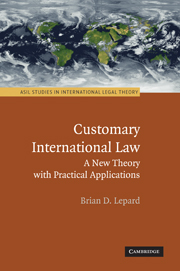Book contents
- Frontmatter
- Contents
- Figures
- Acknowledgments
- Cases
- PART ONE THE ENIGMAS OF CUSTOMARY INTERNATIONAL LAW
- 1 The Need for a New Theory
- 2 Some Conceptual Enigmas
- 3 Some Practical Enigmas
- PART TWO FOUNDATIONS OF A NEW THEORY OF CUSTOMARY INTERNATIONAL LAW
- PART THREE RESOLVING THE CONCEPTUAL ENIGMAS OF CUSTOMARY INTERNATIONAL LAW
- PART FOUR RESOLVING THE PRACTICAL ENIGMAS OF CUSTOMARY INTERNATIONAL LAW
- PART FIVE SOME APPLICATIONS OF THE THEORY
- PART SIX THE FUTURE OF CUSTOMARY INTERNATIONAL LAW
- Bibliography
- Index
1 - The Need for a New Theory
Published online by Cambridge University Press: 05 June 2012
- Frontmatter
- Contents
- Figures
- Acknowledgments
- Cases
- PART ONE THE ENIGMAS OF CUSTOMARY INTERNATIONAL LAW
- 1 The Need for a New Theory
- 2 Some Conceptual Enigmas
- 3 Some Practical Enigmas
- PART TWO FOUNDATIONS OF A NEW THEORY OF CUSTOMARY INTERNATIONAL LAW
- PART THREE RESOLVING THE CONCEPTUAL ENIGMAS OF CUSTOMARY INTERNATIONAL LAW
- PART FOUR RESOLVING THE PRACTICAL ENIGMAS OF CUSTOMARY INTERNATIONAL LAW
- PART FIVE SOME APPLICATIONS OF THE THEORY
- PART SIX THE FUTURE OF CUSTOMARY INTERNATIONAL LAW
- Bibliography
- Index
Summary
CUSTOMARY INTERNATIONAL LAW AND ITS TRADITIONAL DEFINITION
What is customary international law? This question has intrigued scholars and jurists for centuries – and frustrated government officials charged with determining whether a contemplated course of conduct is consistent with a state's international legal obligations.
What is clear, at least, is that customary international law is one of the three main sources of international law, which also include treaties and “general principles of law recognized by civilized nations.” Today it is playing an increasingly prominent role in the international legal system, despite some assertions of its diminishing importance. The International Court of Justice (ICJ) and its predecessor, the Permanent Court of International Justice (PCIJ), have held, or at least suggested, that a vast array of norms have now entered the realm of customary law.
For example, the customary law of human rights has burgeoned. The ICJ has affirmed in a number of its decisions that genocide is prohibited by customary international law. More generally, it has also implied that “the basic rights of the human person, including protection from slavery and racial discrimination” have become part of the corpus of customary law.
Similarly, many crimes under international law are defined primarily by customary law. The statutes of new international criminal tribunals, such as the International Criminal Tribunal for the former Yugoslavia, the International Criminal Tribunal for Rwanda, and the International Criminal Court, make references to customary international law in defining the crimes over which the tribunals have jurisdiction.
- Type
- Chapter
- Information
- Customary International LawA New Theory with Practical Applications, pp. 3 - 13Publisher: Cambridge University PressPrint publication year: 2010
- 2
- Cited by

